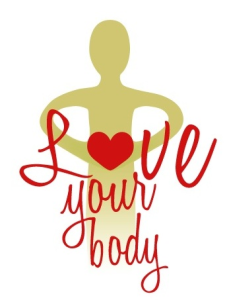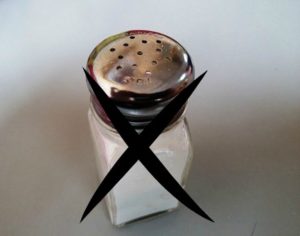
Love Your Body Like God Loves It
Today is Love Your Body Monday, following the most important Sunday in a Christian’s life: Easter! The day that Jesus defied death for believers and rose from the grave to offer everyone who believes in the death and resurrection of Jesus Christ, confesses sins, and asks for forgiveness—eternal life in heaven with Jesus Christ our Lord. Yes, Jesus overcame permanent death for believers, but we still must face the death of our physical bodies.
During my first breast cancer treatment, I witnessed to my atheist radiation oncologist: “Dr. your mission is to provide longevity and stave off death for a while for our earthly bodies; my mission is to help people know the Great Physician who provides eternal longevity and life after we are finished with our earthly bodies.” I think he got it.
[Tweet “Our earthly bodies are a gift from God during the years He gives us to make a decision for Christ”]
Our earthly bodies are a gift from God during the years He gives us to make a decision for Christ, and then were are to live out that decision and help others come to know Him before their, and our, earthly bodies return to dust. Did you ever think of life in that context? We are here for God’s purpose and pleasure, not our own. Therefore, we must treat our bodies as a precious gift and instrument of God.
[Tweet “Sometimes, we treat our bodies like we own them. “]
Sometimes, we treat our bodies like we do own them. We’ve all heard, “It’s my body. I’ll do what I want with it.” This erroneous thinking is also behind the “women’s rights” propaganda. And that’s all it is…lies and misunderstanding from those who the evil one blinds.
[Tweet “We don’t have any rights over our bodies, God does!”]
We don’t have any rights over our bodies, God does! He creates us, numbers our days, and makes no mistakes.
Satan says, “Your body is your own.”
God says, “I knit you together in your mother’s womb.” (Ps 139:13 paraphrased)
Satan says, “Eat whatever you want if it makes you happy.”
God says, “So whether you eat or drink or whatever you do, do it all for the glory of God.” (1 Cor. 10:31)
[Tweet “What a novel thought: eating and drinking for the glory of God.”]
What a novel thought: eating and drinking for the glory of God. What a praise it would be to God if before putting anything in our mouths, we asked ourselves, “Will this glorify God by keeping my body healthy or will this dishonor the amazing temple he has entrusted to me?”
How to Beat or Treat Hypertension
[Tweet “I am amazed at how many people take medicine to lower their blood pressure.”]
In January, we talked about Love Your Body—Prevent or Reverse Type 2 Diabetes. Today, I want to mention another illness that could be prevented or treated by proper diet and exercise: high blood pressure. I am amazed at how many people take medicine to lower their blood pressure. High sodium intake can increase blood pressure and most processed, packaged, and processed foods are very high in sodium. Even if you never salt your food, if you eat these foods regularly, you are taking in higher levels of sodium than are healthy for a normal body.
According to the Mayo Clinic, here is a definition and risk factors of High Blood Pressure also known as Hypertension:
High blood pressure is a common condition in which the long-term force of the blood against your artery walls is high enough that it may eventually cause health problems, such as heart disease.
Blood pressure is determined both by the amount of blood your heart pumps and the amount of resistance to blood flow in your arteries. The more blood your heart pumps and the narrower your arteries, the higher your blood pressure.
High blood pressure has many risk factors, including:
- Age. The risk of high blood pressure increases as you age. Through early middle age, or about age 45, high blood pressure is more common in men. Women are more likely to develop high blood pressure after age 65.
- Race. High blood pressure is particularly common among blacks, often developing at an earlier age than it does in whites. Serious complications, such as stroke, heart attack and kidney failure, also are more common in blacks.
- Family history. High blood pressure tends to run in families.
- Being overweight or obese. The more you weigh the more blood you need to supply oxygen and nutrients to your tissues. As the volume of blood circulated through your blood vessels increases, so does the pressure on your artery walls.
- Not being physically active. People who are inactive tend to have higher heart rates. The higher your heart rate, the harder your heart must work with each contraction and the stronger the force on your arteries. Lack of physical activity also increases the risk of being overweight.
- Using tobacco. Not only does smoking or chewing tobacco immediately raise your blood pressure temporarily, but the chemicals in tobacco can damage the lining of your artery walls. This can cause your arteries to narrow, increasing your blood pressure. Secondhand smoke also can increase your blood pressure.
- Too much salt (sodium) in your diet. Too much sodium in your diet can cause your body to retain fluid, which increases blood pressure.
- Too little potassium in your diet. Potassium helps balance the amount of sodium in your cells. If you don’t get enough potassium in your diet or retain enough potassium, you may accumulate too much sodium in your blood.
- Too little vitamin D in your diet. It’s uncertain if having too little vitamin D in your diet can lead to high blood pressure. Vitamin D may affect an enzyme produced by your kidneys that affects your blood pressure.
- Drinking too much alcohol. Over time, heavy drinking can damage your heart. Having more than two drinks a day for men and more than one drink a day for women may affect your blood pressure.
- Stress. High levels of stress can lead to a temporary increase in blood pressure. If you try to relax by eating more, using tobacco or drinking alcohol, you may only increase problems with high blood pressure.
- Certain chronic conditions. Certain chronic conditions also may increase your risk of high blood pressure, such as kidney disease, diabetes and sleep apnea.
Everything on the above list except for age, race, family history, and certain chronic conditions are controllable by us! Several of these controllable areas, we’ve talked about previously on Love Your Body Monday!
Weight Loss: Love Your Body—Maintain Weight Loss and Love Your Body—Break the Food Strongholds and Love Your Body—Weight Loss is Not the Goal
Become more physically active: Love Your Body—Use Technology to Lose Weight
Drinking: Love Your Body—Don’t Drink Alcohol
If you smoke, you need to stop smoking.
We will talk in future blogs about eliminating stress.
Reduce Sodium intake: Love Your Body–Read Labels discusses the importance of reading labels on food you purchase. You can look for sodium content on the label per the serving they indicate, which might only be a half cup or 5 pieces. You need some sodium, but if you have high blood pressure, your doctor may want you limiting to 1500-3000 mg a day, which can add up quickly just in natural food. So you must read labels for sodium content and avoid obviously salty food. Here is a great article on how sodium effects high blood pressure, recommended intake of sodium, and high-sodium foods to avoid: Salt and High Blood Pressure.

At our house, I don’t put a saltshaker on the table, and I use very little salt in cooking, but rely on fresh herbs and salt-free seasonings for flavor. Both my husband and I have normal blood pressure. Sometimes visitors ask for the saltshaker without even tasting the food to see if it even needs salt! Is that you?
 Increase potassium and Vitamin D: Here is a good article on nine foods that can reduce high blood pressure and increase potassium and Vitamin D in your diet: Nine Foods That Reduce High Blood Pressure.
Increase potassium and Vitamin D: Here is a good article on nine foods that can reduce high blood pressure and increase potassium and Vitamin D in your diet: Nine Foods That Reduce High Blood Pressure.
Let me stress that the ideal is to avoid having an illness or “condition”. Taking preventative measures—instead of waiting until you have a problem that you could potentially sidestep– could prevent having to take medications, which always have side effects. And isn’t that just like everything in life: proactive always trumps reactive.
If you received this blog by email, please leave a comment here.









Leave a Comment